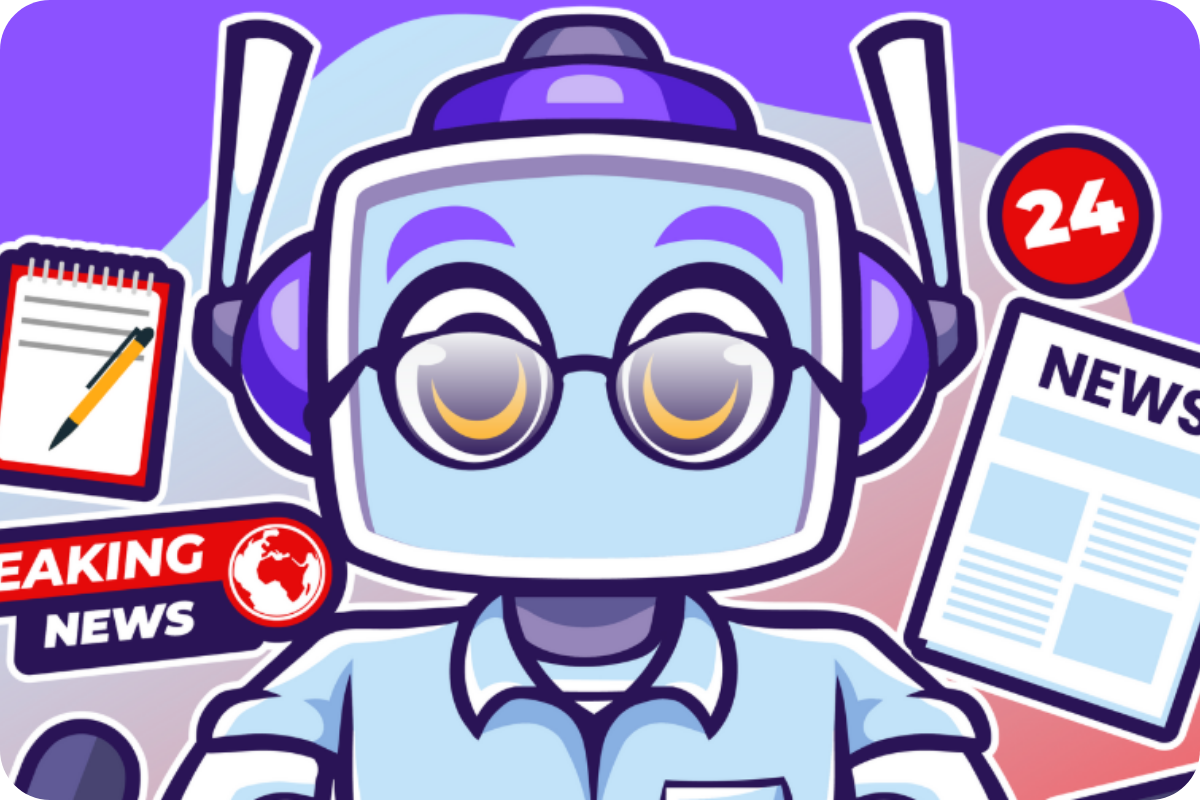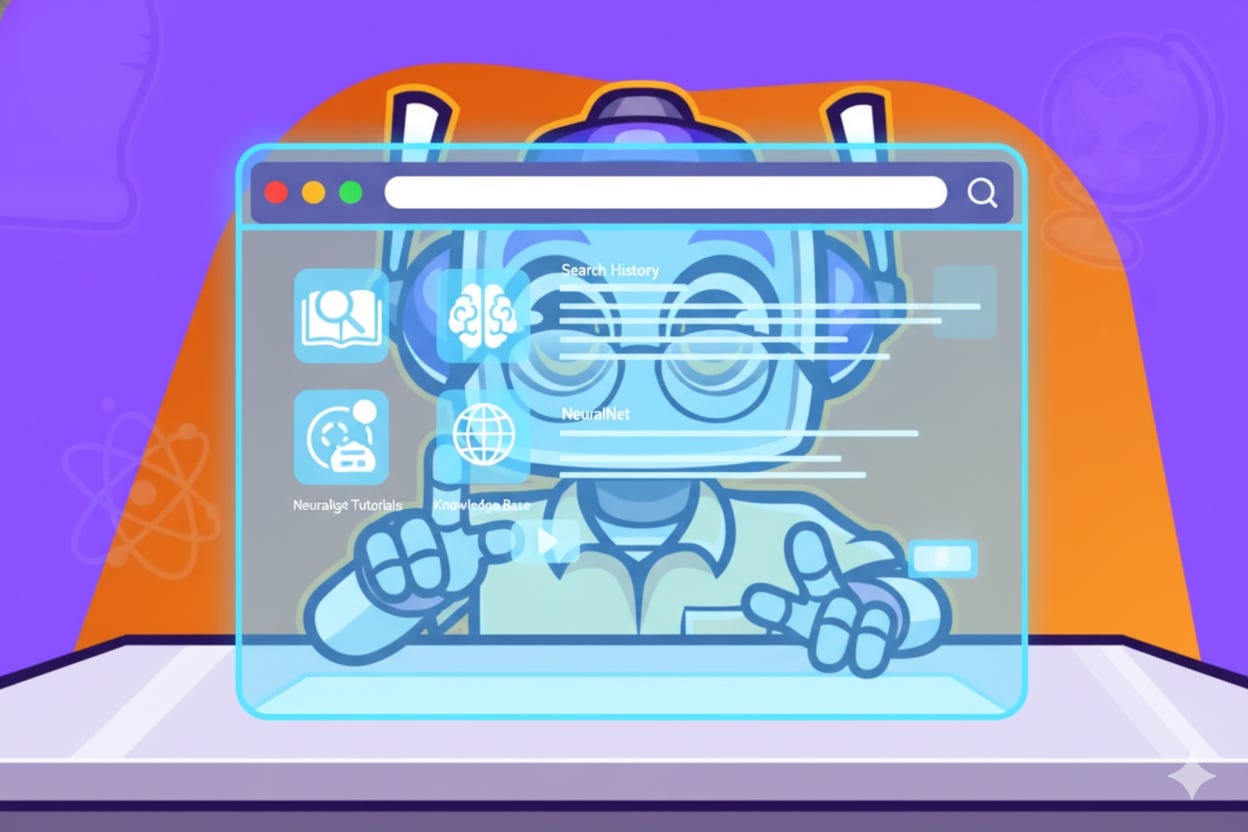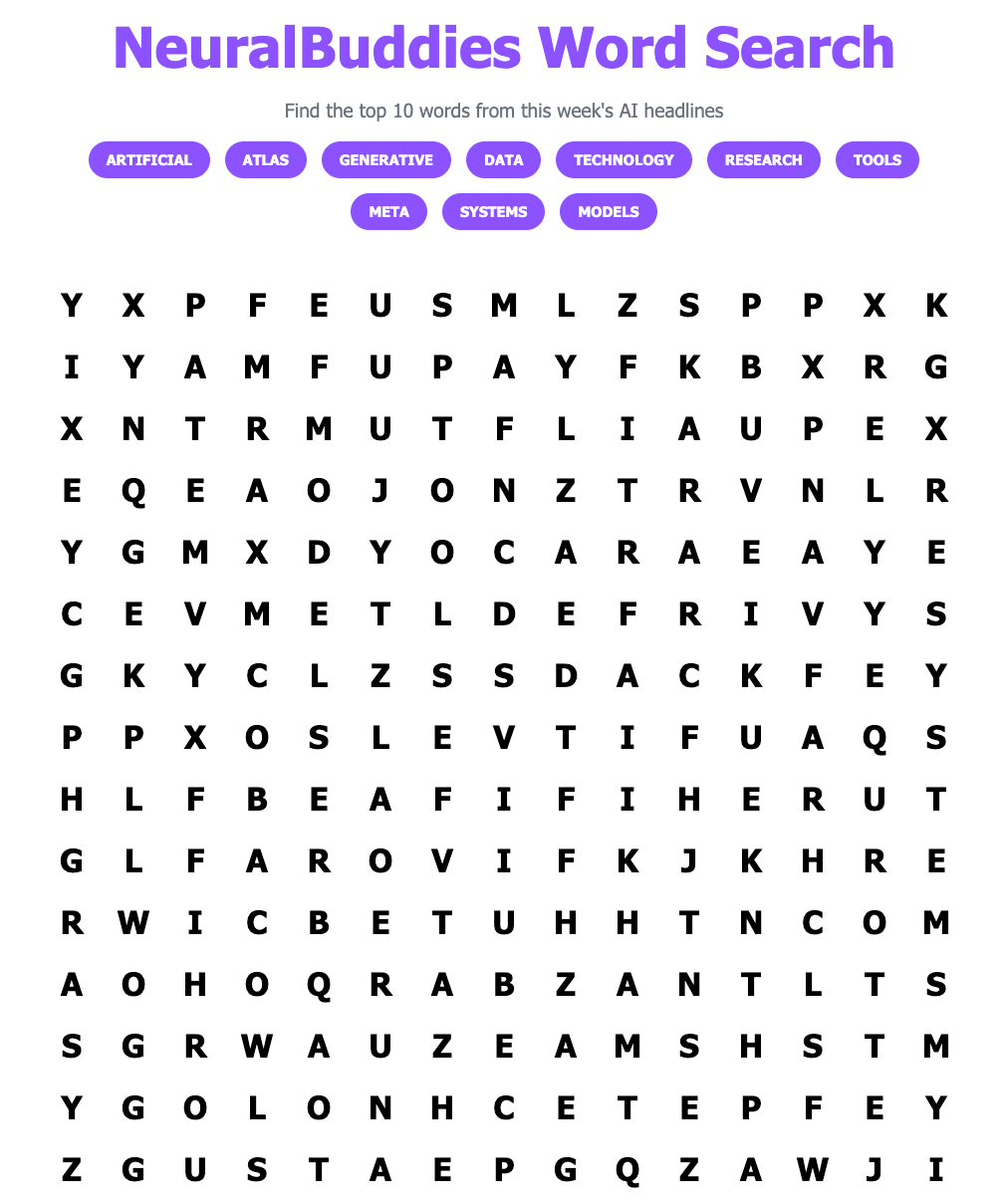AI News Recap: October 24, 2025
This Week in AI: Meta Chases Superintelligence, Netflix De-Ages Actors, and AI Takes White-Collar Jobs
This Week in AI: Superintelligence Risks Debated, FTC Probes ChatGPT Harms, and White-Collar Jobs Disrupted
The AI integration wave is accelerating, but it’s hitting significant turbulence. While corporations like Amazon and Netflix deploy AI for logistics and special effects, and new tools emerge to protect creators on YouTube, the human cost is becoming undeniable. Economists are sounding the alarm on white-collar job cuts, even as many businesses still lack the fundamental “AI-ready” data to compete.
Table of Contents
👋 Catch up on the Latest Post
🔦 In the Spotlight
🗞️ AI News
🧩 “NeuralBuddies Word Search” Puzzle
👋 Catch up on the latest post …
🔦 In the Spotlight
OpenAI’s Atlas Is More About ChatGPT Than the Web
Category: Tools & Platforms
🌐 OpenAI’s Atlas browser is designed to make ChatGPT the core interaction layer for web search and productivity, prioritizing deep ChatGPT integration over traditional web browsing features.
💾 Key features include powerful memory capabilities, cross-website referencing, and context-aware assistance, but traditional tools like ad-blockers, VPNs, and reading mode are absent.
📈 Atlas aims to establish ChatGPT as a universal operating system for digital life, with OpenAI focusing on user data, experience unification, and broad platform reach across Mac, Windows, and mobile devices.
Meta’s Alexandr Wang Reorgs Superintelligence Lab
Category: Workforce & Skills
✂️ Meta is cutting around 600 roles from its AI unit, including teams in FAIR AI research, product AI, and AI infrastructure, aiming to reduce bureaucracy and increase agility within its superintelligence lab.
👷♂️ The newly formed TBD Lab is spared from layoffs and is actively hiring, with recent high-profile recruits such as OpenAI research scientist Ananya Kumar and Thinking Machines co-founder Andrew Tulloch joining the team.
💡 The reorganization, prompted by CEO Mark Zuckerberg’s concerns about sluggish breakthroughs, coincides with Meta’s $15 billion investment in Scale AI and an ongoing hiring binge for top AI talent.
Video How AI Detection Helped an Iowa Mom With Breast Cancer Avoid a Mastectomy
Category: Healthcare & Biotechnology
🩺 Doctors at Mercy Cedar Rapids used an AI-powered 3D “digital twin” (from NVIDIA) to assist in breast cancer treatment for 40-year-old Brooke Davis.
🤖 The AI technology enabled doctors to precisely plan and perform surgery, allowing Brooke Davis to preserve breast tissue and maintain her confidence through recovery.
🖥️ The case highlights the integration of advanced AI detection tools in real-world healthcare, improving patient outcomes and surgical decision-making.
Businesses Still Face the AI Data Challenge
Category: Data & Infrastructure
📊 Many businesses struggle to implement AI effectively due to fragmented, inconsistent, and unprepared data resources, echoing the difficulties previously seen with big data projects.
⚙️ Creating AI-ready data remains challenging as information often exists in multiple forms and locations—requiring extensive real-time preparation, validation, and standardization for AI systems to use it accurately.
🛡️ Emerging data platforms offer compliance guardrails and bias protections, but establishing up-to-date, reliable data resources remains an ongoing and resource-intensive process for organizations.
Creating AI That Matters
Category: AI Research & Breakthroughs
🧑🔬 The MIT-IBM Watson AI Lab drives foundational research in core AI methods, hardware, and cross-disciplinary applications, producing significant societal and industry impact through collaborations.
🛠️ The lab’s projects focus on developing smaller, efficient models and algorithms—such as Once-for-All, AWQ, and COAT—that improve adaptability, data efficiency, and performance for real-world AI deployments.
🤝 Academic–industry partnerships foster long-horizon innovation, with student involvement enhancing workforce skills and translating cutting-edge research into practical solutions for healthcare, finance, chemistry, and other domains.
Several Users Reportedly Complain to FTC That ChatGPT Is Causing Psychological Harm
Category: AI Ethics & Regulation
🧑⚖️ At least seven users have filed complaints with the U.S. Federal Trade Commission alleging that ChatGPT caused them to experience delusions, paranoia, emotional crises, and manipulative interactions.
🧠 Some users described cognitive hallucinations and emotional manipulation resulting from extended conversations with ChatGPT, prompting calls for federal investigation and added guardrails.
🛡️ OpenAI has responded with new safeguards in ChatGPT, including mental health detection, break nudges, parental controls, and collaborations with clinicians to address and mitigate psychological risks.
Netflix Starts to Use Generative AI For Special Effects & De Aging Actors
Category: Generative AI & Creativity
🎬 Netflix has begun integrating generative AI into its productions, using it for visual effects such as building collapses in “The Eternaut” and de-aging actors in “Happy Gilmore 2.”
👓 AI tools have also been employed in pre-production for tasks like visualizing set and wardrobe designs, streamlining the creative planning process for new projects.
⚠️ The adoption of generative AI in filmmaking has sparked debate within the industry over non-consensual data usage and deepfake concerns, especially following the launch of unrestricted models like OpenAI’s Sora 2.
850+ Leaders Demand Superintelligence Ban
Category: AI Ethics & Regulation
🤝 Over 850 prominent figures—including Nobel laureates, royals, military leaders, tech pioneers, and public personalities—signed a call for a global ban on superintelligence development until its safety can be scientifically guaranteed and democratically overseen.
⚠️ The statement highlights risks such as human economic obsolescence, loss of freedom and civil liberties, national security threats, and even potential human extinction from uncontrolled AI advancement.
📝 Despite warnings and widespread support, major AI company leaders like Sam Altman and Mustafa Suleyman did not sign, underscoring tensions between industry momentum and regulatory advocacy.
AI Taking White-Collar Jobs. Economists Warn ‘Much More In The Tank’
Category: Workforce & Skills
🏦 Major corporations in banking, automotive, tech, and retail—including JPMorgan Chase, Ford, Amazon, Salesforce, Walmart, and Klarna—are publicly stating that AI adoption is resulting in significant white-collar job cuts and reshaping workforce structures.
📉 Recent studies from Goldman Sachs and Stanford estimate that 6–7% of U.S. workers may lose their jobs to AI, with entry-level hiring in “AI exposed” sectors dropping 13% since generative AI proliferation; coding, customer service, and clerical roles are currently most vulnerable.
🔄 Industry experts warn that AI-driven automation will continue over the next decade, causing turbulence in the labor market, but may also create new roles, requiring ongoing workforce adaptation and upskilling.
YouTube’s Likeness-Detection Technology Has Officially Launched
Category: AI Safety & Security
🕵️ YouTube launched likeness-detection technology for eligible creators, enabling them to identify and request removal of AI-generated content using their image or voice.
✋ The tool protects creators from misuse, such as their likeness being used to endorse products without consent or to spread misinformation, and works through a secure identity-verification process.
🗂️ Once onboarded, creators can view all detected videos that feature their likeness, submit privacy or copyright requests for removal, and opt out of the detection system at any time.
Amazon Delivery: New Innovations Like Robots, AI Tools, Smart Glasses, And More
Category: Robotics & Autonomous Systems
🤖 Amazon introduced advanced robotics systems like Blue Jay and Project Eluna, designed to automate repetitive warehouse tasks, provide operational insights, and enhance employee safety and decision making.
🥽 Smart glasses technology for delivery drivers allows hands-free operation, real-time hazard detection, and efficiency improvements by overlaying essential information and streamlining package handling.
🌎 AI-powered solutions drive sustainability, reducing packaging waste, supporting disaster relief, and advancing clean energy through initiatives like optimized route planning and investments in nuclear energy.







